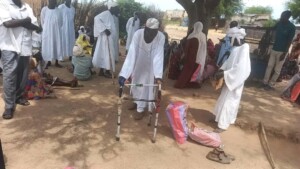Sudan: Four cases of dengue fever suspected in Kassala
The Health Emergency and Epidemic Control section of the Department of Health Affairs in Kassala state, announced yesterday the emergence of four suspected cases of dengue haemorrhagic fever and confirmed that it had reported the cases to the Emergency and Epidemic Control Department at the Ministry of Health.
 The haemorrhagic fever virus under a microscope (File photo)
The haemorrhagic fever virus under a microscope (File photo)
The Health Emergency and Epidemic Control section of the Department of Health Affairs in Kassala state, announced yesterday the emergence of four suspected cases of dengue haemorrhagic fever and confirmed that it had reported the cases to the Emergency and Epidemic Control Department at the Ministry of Health.
The suspected cases are from separate areas inside and outside Kassala locality (Abu Khamsa, Makram, Abu Dahan and Awad). The administration said that three samples were taken, which were delivered to the Epidemiological Control Department at the Ministry of Health yesterday, to be sent to the National Laboratory (ASTAC).
The onset of the rainy season in Sudan sees an annual upsurge in in infections, a mosquitoes, which are the vector for many diseases in the Nile valley, breed prolifically in standing water. Research shows that the outbreak recorded last year began in Bexala.
* Haemorrhagic fevers are severe acute viral infections, usually with a sudden onset of fever, malaise, headache, and myalgia followed by pharyngitis, vomiting, diarrhoea, skin rash, and haemorrhagic manifestations. The outcome is fatal in more than 50 per cent of the cases, the World Health Organisation reports. Among the fevers recently recorded in Sudan are dengue fever and Rift Valley fever (RVF). Viruses that cause dengue fever are transmitted by mosquitoes. RVF can be acquired either by a mosquito bite or by direct contact with blood or tissues of infected animals (mainly sheep), including consumption of unpasteurised milk.











 and then
and then